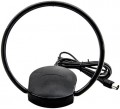Amplification coefficient
The amount of received signal amplification provided by the antenna. The higher this indicator, the more confidently the antenna will work in conditions of poor reception, the lower the signal level at which it will be ineffective. At the same time, it is worth considering that a high amplification coefficient is not a guarantee of high quality. Firstly, unscrupulous manufacturers and sellers may indicate figures in the specifications that do not correspond to real indicators. Secondly, the antenna amplifies not only the useful signal, but also various interferences, and in some cases a low amplification coefficient is preferable (for example, in dense multi-storey buildings, when the signal reaches the antenna from different directions and with different delays). And thirdly, performance above 40 dB can only be achieved using amplifiers (see below) — and amplifiers are also a source of noise, which in some situations can be quite noticeable.
VHF frequency range
The frequencies in the VHF range for which the antenna is designed. VHF includes frequencies from 30 to 300 MHz antennas with full coverage of this range are quite rare, but this is not required, because TV broadcast frequencies occupy only a part of VHF, and this part usually overlaps quite well.
Antenna sellers generally choose to sell models that are compatible with local frequencies. Therefore, in general, the frequency range is a rather specific parameter that the average user rarely needs — except when buying an antenna in another country. Also note that FM broadcasting in Europe and America uses the 87.5 – 108 MHz range, and antennas for such broadcasting (see "Signal Reception"), by definition, must cover these frequencies.
Output impedance
The internal resistance of the antenna to alternating current. The standard value for modern TV antennas is 75 ohms; it is this impedance that the connecting cable used to connect the antenna to the receiver should have — otherwise there can be no question of normal use.
Amplifier
The presence
of an active signal amplifier in the design of the antenna.
Any antenna amplifies the received signal due to its shape only, however, in some models, the design is supplemented by a separate electronic unit that increases the signal level at the output — an active amplifier. Antennas with this feature have the advantage of high amplification coefficient, which can also be achieved at a much smaller size than in models without amplifier. On the other hand, the amplifier requires an external power supply and is a potential source of interference since its circuits inevitably create their own noises. Therefore, in fact, the use of such antennas is justified only in areas with a weak signal level and the absence of interference and reflections — for example, in rural areas at a great distance from the repeater. In conditions of confident signal reception, the amplifier can turn out to be not only useless, but even harmful.
Variable tilt angle
The capability to change the tilt angle of the antenna relative to the stand or mount (for indoor and outdoor, respectively, see "Installation type"). This feature can greatly facilitate the selection of the optimal position, especially if the antenna has a narrow directivity or is used in urban areas with an abundance of reflected signals.
Cable length
The length of the connecting cable supplied with the antenna (often non-detachable). Quite a lot of models come with a cable right away, which eliminates the need to purchase it separately. And knowing the length of the cable, you can evaluate whether it is enough to reach the TV without additional cables.

